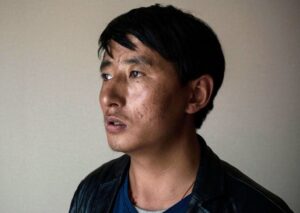 Tibetan language activist Tashi Wangchuk, 35, who was released from prison last year after serving three years in prison for his advocacy of the Tibetan language, is reportedly again being monitored by the Chinese authorities, as he continues to advocate for the use and the study of the Tibetan language in the local population as well as schools.
Tibetan language activist Tashi Wangchuk, 35, who was released from prison last year after serving three years in prison for his advocacy of the Tibetan language, is reportedly again being monitored by the Chinese authorities, as he continues to advocate for the use and the study of the Tibetan language in the local population as well as schools.
According to Radio Free Asia (RFA),anonymous sources have confirmed since April 6 he has visited various schools in Golog, Rebgong and Malho whileon his way from Yushu to Siling. They report that he was banned from several hotels and that the hotel management had been ordered to turn him away. Wangchuk filed a complaint at a nearby police station in Mahlo prefecture but was denied entry. He then went on to Rebgong to file for appeal at the county’s Commission for Discipline Inspection, but it was closed. Since April 10, all his posts, pictures and videos have been deleted from Weibo, a Chinese social media app widely used in Tibet. For some time following this his whereabouts were unknown; RFA later reported that Wangchuk is currently in 15-day Covid-19 quarantine at his brother’s place in Siling. Concerns for his wellbeing however remain since the authorities continue to monitor his movements.
Due to his peaceful advocacy for Tibetan language rights, he previously has been sentenced to five years in prison for “inciting separatism” in May 2018. Tashi Wangchuk began to stand up for Tibetan language rights after he was unable to find any classes for his nieces in Kheygu prefecture. Although the area is predominantly inhabited by Tibetans, it lies outside the Tibet Autonomous region. The government has outlawed the teaching of Tibetan to lay people in both schools and monasteries in line with their policy of ensuring that Chinese is the dominant language spoken. The linguistic rights of ethnic minorities are explicitly protected by China’s constitution, but Mandarin Chinese is the only language taught in schools, and some schools teaching through the medium of Tibetan have been forced to shut down. These assimilation tactics have also been deployed against ethnic Mongolians and Muslim Uyghurs, both populations living in China under a régime similar to that deployed in Tibet.
Wangchuk was secretly imprisoned in 2016 after a featuring in New York Times documentary and associated article in which he called for the use of the Tibetan language in both government offices and education. At no time has he ever advocated separatism for Tibet or campaigned against Chinese rule there. His family was first informed of his plight three months after his detention, although a Chinese law states that families of detainees must be notified within 24 hours. It was two years before his official trial took place in 2018. After completing his sentence, he was released from prison on January 28, 2021. He remains under government surveillance and a five-year deprivation of political rights. Pema Gyal – a researcher at London-based Tibet Watch research and advocacy group – confirmed that former political prisoners are blacklisted by the Chinese government and often face problems finding jobs or accommodation in hotels.




 Print
Print Email
Email